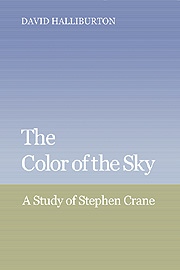Book contents
- Frontmatter
- Contents
- 1 Introduction
- 2 The Little: Early Writings
- 3 Conflict as Condition: Maggie: A Girl of the Streets
- 4 Doing Without: George's Mother
- 5 Eternal Fact and Mere Locality: The Red Badge of Courage: An Episode of the American Civil War
- 6 The Mysteries of Heroism and the Aesthetics of War: Army Tales and Other War Writings
- 7 Community and Crisis: “The Monster,” Tales of Whilomville, “The Blue Hotel,” “The Bride Comes to Yellow Sky”
- 8 The Ethics of Their Condition and the Unreal Real: “The Open Boat,” “The Five White Mice”
- 9 The Farther Shore: Poems
- Notes
- Index
5 - Eternal Fact and Mere Locality: The Red Badge of Courage: An Episode of the American Civil War
Published online by Cambridge University Press: 06 July 2010
- Frontmatter
- Contents
- 1 Introduction
- 2 The Little: Early Writings
- 3 Conflict as Condition: Maggie: A Girl of the Streets
- 4 Doing Without: George's Mother
- 5 Eternal Fact and Mere Locality: The Red Badge of Courage: An Episode of the American Civil War
- 6 The Mysteries of Heroism and the Aesthetics of War: Army Tales and Other War Writings
- 7 Community and Crisis: “The Monster,” Tales of Whilomville, “The Blue Hotel,” “The Bride Comes to Yellow Sky”
- 8 The Ethics of Their Condition and the Unreal Real: “The Open Boat,” “The Five White Mice”
- 9 The Farther Shore: Poems
- Notes
- Index
Summary
ENTITLEMENT
Titles entitle in several ways. Some condense a work to its essence, and all titles do this to one degree or another. Their leading words suggest, in the case of literary works, an imaginary order to which the title itself is a first indication. Insofar as a title inheres in the work it inaugurates, it stands in a synecdochic relation to that work. Titles serve at the same time a metonymic function. Abbreviating the work as a whole by substituting a few words, or even a single word, for the many words of the work, the title starts a chain of contiguities that, by a process of association, replacement, and supplementation, comes to constitute the work in its entirety.
Titles wield onomastic power. In all of Western literature nothing illustrates this better than the title Sophocles gave to his most celebrated play. With his swollen (poús) foot, Oedipus is visibly the child abandoned to die, even as he is the one who knows (oido) not only the riddle of the foot but the meaning of the Sphinx. By the names of its hero the title suggests the essential meaning of the play as a whole.
If few titles achieve such semantic saturation within a single name, many are productively “overdetermined” nonetheless. The Don Quijote of Cervantes's title is revealed to be, or at least to have been called, Quixada, Quesada, or Quixana; he becomes Quijote only in his knightly stage.
- Type
- Chapter
- Information
- The Color of the SkyA Study of Stephen Crane, pp. 98 - 144Publisher: Cambridge University PressPrint publication year: 1989



